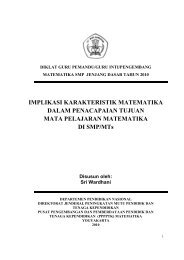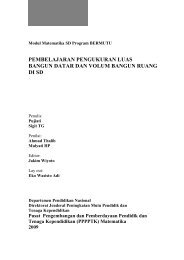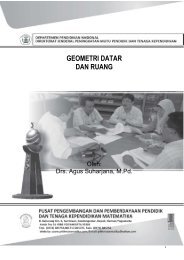25 Biggest Mistakes Teachers Make and How to Avoid Them
25 Biggest Mistakes Teachers Make and How to Avoid Them
25 Biggest Mistakes Teachers Make and How to Avoid Them
You also want an ePaper? Increase the reach of your titles
YUMPU automatically turns print PDFs into web optimized ePapers that Google loves.
Mistake 12: Inappropriate Classroom Policies<br />
flexible rules that do not count<br />
excused absences against perfect<br />
attendance. If attendance is an<br />
SCENARIO 12.11<br />
Sounding Off<br />
administrative matter, administra<strong>to</strong>rs<br />
should consider the approach previously<br />
outlined for teachers.<br />
The fifth-grade teacher would say the meanest things about me. She would make me<br />
leave the classroom <strong>to</strong> blow my nose—“nobody wants <strong>to</strong> hear that.” She would give<br />
everybody else stickers just because she “liked” them, not because of their academic<br />
qualifications. No B<strong>and</strong>-Aids can ever make it right.<br />
The teacher in this scenario<br />
had a natural reaction <strong>to</strong> an<br />
offensive body sound. She reacted so<br />
intensely that the child was offended<br />
<strong>and</strong> perceived her comments as<br />
mean-spirited.<br />
Practical teachers know that in a<br />
classroom situation, potentially offensive<br />
body sounds such as blowing<br />
the nose, hacking coughs, passing<br />
gas, belching, or burping are inevit -<br />
able. Experienced teachers ignore<br />
these sounds if possible. For situations<br />
that are impossible <strong>to</strong> ignore, these<br />
SCENARIO 12.12<br />
“Loser of the Week”: A Real Loser<br />
teachers set up an effective classroom<br />
policy <strong>to</strong> address these foreseeable<br />
events. They might have a “quick<br />
pass” that students can pick up at any<br />
time that they need <strong>to</strong> excuse themselves.<br />
The “quick pass” alerts the<br />
teacher that the student has a personal<br />
emergency that requires immediate<br />
attention. <strong>Teachers</strong> should explain the<br />
rules of using the “quick pass,” such as<br />
the shorter length of time, <strong>and</strong> so forth.<br />
The goal is <strong>to</strong> take care of students’<br />
needs without drawing attention <strong>to</strong><br />
the student or disturbing the class.<br />
In high school, my math teacher would ask each student <strong>to</strong> tell the class something that<br />
had happened <strong>to</strong> them. This tidbit could be something that was stupid, embarrassing,<br />
or silly. Then she would choose what she called “Loser of the Week.” This person had<br />
<strong>to</strong> st<strong>and</strong> in the front of the classroom where the entire class would salute him or her<br />
by making a big “r” sign with his or her arms. We had this helmet we had <strong>to</strong> wear <strong>and</strong><br />
a special desk in the front of the room. I was the loser many times.<br />
The first two sentences of this<br />
scenario raise the question of<br />
“What is the point?” The practice of<br />
selecting the loser of the week is<br />
either a sadistic, malicious act, or a<br />
bad joke that has gone <strong>to</strong>o far. Having<br />
students taunt <strong>and</strong> ridicule the student<br />
who had the dubious honor of<br />
being chosen is reminiscent of the<br />
bygone days of Roman persecution of<br />
87





